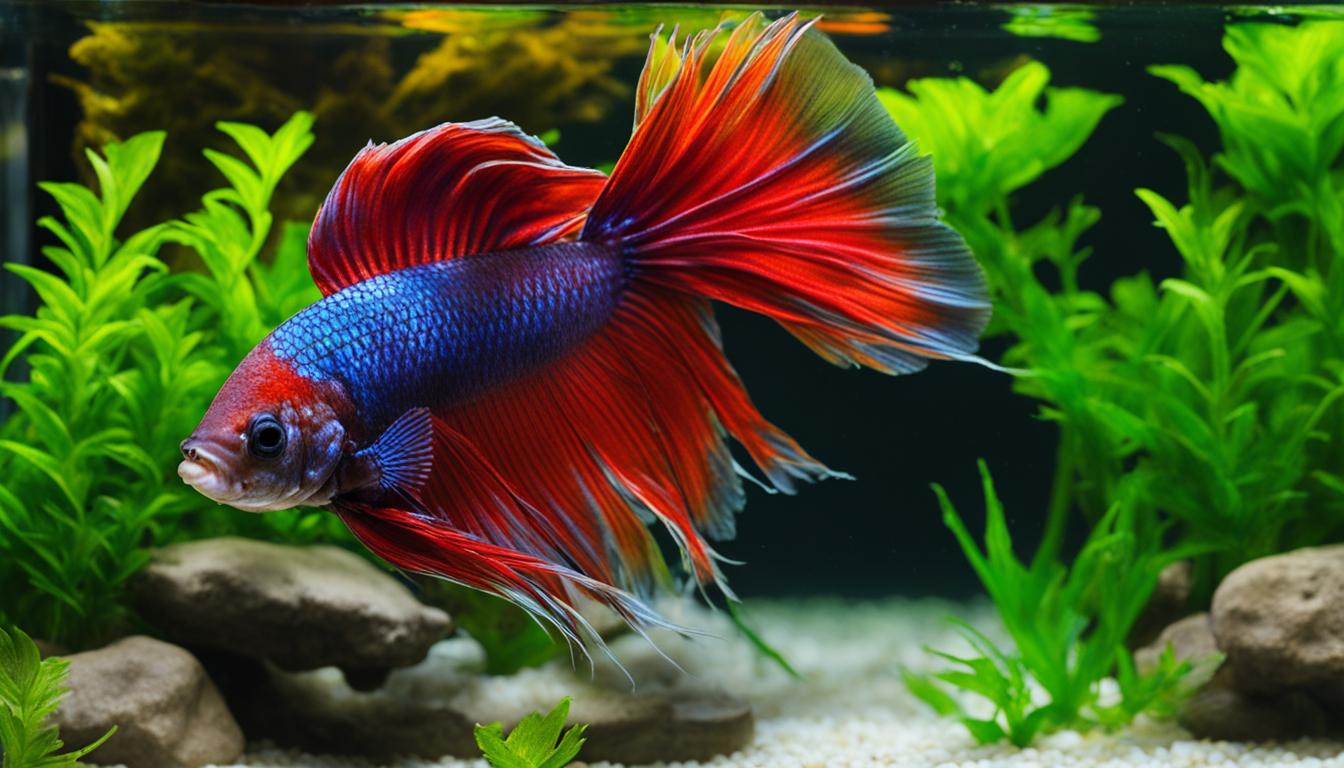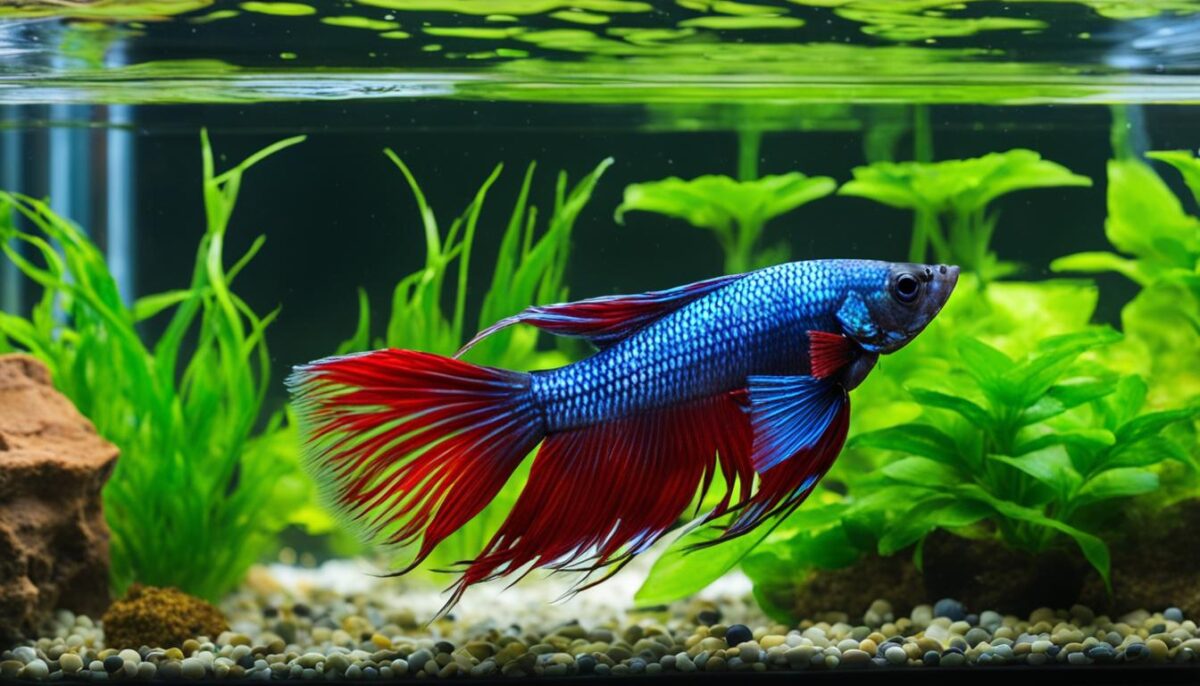Are you a proud owner of a betta fish or thinking of getting one? Betta fish, also known as Siamese fighting fish, make stunning and captivating pets. But did you know that taking care of them requires a little extra attention? In this article, we will guide you on the essentials of betta fish care, including tips on maintaining water quality, creating the ideal habitat, and ensuring a balanced diet for your finned friend.
Key Takeaways:
- Consistent water quality and parameters are crucial for betta fish health and well-being.
- Provide an appropriate habitat with the right tank size, gentle filtration, and suitable water temperature and pH levels.
- Add plants, substrate, and decorations to enhance your betta fish’s habitat and provide stimulation.
- Feed your betta fish a balanced diet using a variety of food options.
- Monitor your betta fish’s behavior and appearance for signs of illness or distress, and consult a veterinarian if needed.
Creating the Ideal Betta Fish Habitat
When setting up a habitat for your betta fish, it is important to create an environment that mimics their natural habitat as closely as possible.
Start by choosing an aquarium of appropriate size for your betta fish. A minimum of five gallons is recommended for a single betta fish to ensure they have enough space to swim and explore.
Next, provide gentle water filtration to maintain a clean and healthy habitat. This helps to remove waste and toxins from the water, keeping it safe for your betta fish. Additionally, ensure that the water temperature is kept between 74-81 degrees Fahrenheit, as betta fish thrive in warm water conditions.
Keeping the pH levels of the water around 6-8 is essential for a balanced and stable environment. Betta fish also need plants to rest and hide in, so adding live or artificial plants to their habitat is beneficial. A substrate of gravel or sand provides a natural feel and allows for easy maintenance.
Enhance their habitat by adding aquarium-safe decorations and accessories. This not only adds visual appeal but also provides stimulation for your betta fish.
One unique characteristic of betta fish is their ability to breathe air from the surface. Ensure they have access to air by providing an open area for them to reach the water’s surface.
Proper tank maintenance is crucial for a healthy betta fish habitat. This includes regular water testing to monitor the water quality, partial water changes to remove any accumulated waste, and cleaning of tank decorations to prevent the buildup of algae or bacteria.
Recommended Betta Fish Tank Sizes
| Number of Betta Fish | Minimum Tank Size |
|---|---|
| 1 | 5 gallons |
| 2 | 10 gallons |
| 3 | 15 gallons |
Creating the ideal betta fish habitat requires careful consideration of their needs and preferences. By providing an appropriate tank size, maintaining water quality, and adding the necessary elements for stimulation and comfort, you can ensure that your betta fish thrives in their new home.
Feeding and Health Care for Betta Fish
Proper feeding is crucial for the health and well-being of your betta fish. As carnivores, bettas require a diet that consists of a variety of foods to meet their nutritional needs. You can choose from options such as betta fish flakes, frozen or freeze-dried brine shrimp or bloodworms, and betta pellets.
It’s important to feed your betta fish in appropriate quantities and avoid overfeeding. Follow the recommended feeding guidelines provided by the manufacturer of the food you choose. Monitoring your betta’s appetite and adjusting the feeding schedule as needed is essential for their health.
Aside from feeding, it’s crucial to keep an eye on your betta fish’s behavior and appearance. These indicators can help you detect any signs of illness or distress. Common health issues in betta fish include cuts or scrapes, inflamed or discolored skin or fins, and changes in appetite or behavior.
Tip: If you notice any concerning signs, it’s best to consult a veterinarian who is familiar with betta fish health care. They can provide guidance and treatment if necessary.
To give you a better understanding of betta fish health care, here is a table summarizing the common health issues and their corresponding signs:
| Common Health Issues | Signs and Symptoms |
|---|---|
| Cuts or scrapes | Visible wounds or redness |
| Inflamed or discolored skin or fins | Swelling, redness, or change in color |
| Changes in appetite or behavior | Loss of appetite, lethargy, or unusual behavior |
Remember, providing proper nutrition and monitoring your betta fish’s health are essential for their overall well-being. With good care and attention, you can help your betta fish live a healthy and happy life.
Conclusion
Taking care of a betta fish is a rewarding and fulfilling experience. By following the tips outlined in this betta fish care guide, you can ensure that your pet thrives and stays healthy. Remember, attention to detail and proper knowledge of their needs are key.
Maintaining water quality is essential for the well-being of your betta fish. Regularly monitor the temperature, pH levels, and cleanliness of their tank to create a suitable habitat. Providing the right tank size and accessories, such as plants and hiding spots, is also crucial for their comfort.
Feeding your betta fish a balanced diet is vital. Choose high-quality betta fish flakes, frozen or freeze-dried options like brine shrimp or bloodworms, and betta pellets. Be mindful not to overfeed and follow the recommended feeding guidelines.
Monitoring your betta fish’s health is important in detecting any signs of illness or distress. Stay alert for cuts, inflamed or discolored skin or fins, and changes in appetite or behavior. If you notice any concerns, consult a veterinarian familiar with betta fish health.
Overall, with dedication and proper care, you can create a healthy and loving environment for your betta fish. These unique and beautiful pets can bring joy and companionship when well-cared for. Enjoy the journey of being a betta fish owner and provide the best possible care for your aquatic friend.
FAQ
How do I set up an ideal habitat for my betta fish?
To create the ideal habitat for your betta fish, choose an aquarium of appropriate size, provide gentle water filtration, maintain the ideal water temperature between 74-81 degrees Fahrenheit, and keep the pH levels around 6-8. Additionally, add plants for resting and hiding, use gravel or sand as substrate, and consider adding artificial plants and other aquarium-safe accessories for stimulation. Ensure access to air as betta fish have a unique ability to breathe air from the surface. Regular tank maintenance, including water testing, partial water changes, and cleaning of tank decorations, is also necessary.
What should I feed my betta fish?
Betta fish are carnivores, and their diet can consist of betta fish flakes, frozen or freeze-dried options like brine shrimp or bloodworms, and betta pellets. It is important to feed them in appropriate quantities, avoiding overfeeding, and follow the recommended feeding guidelines provided by the manufacturer. Monitor their appetite and adjust the feeding schedule as needed.
How can I monitor the health of my betta fish?
Monitor your betta fish’s behavior and appearance for any signs of illness or distress. Look for cuts or scrapes, inflamed or discolored skin or fins, and changes in appetite or behavior. If any concerns arise, consult a veterinarian who is familiar with betta fish health.
What are the essential tips for betta fish care?
To ensure the health and well-being of your betta fish, it is essential to maintain consistent water quality and parameters, provide the right tank size and accessories, feed them a proper diet, and monitor their health. This includes monitoring water temperature, pH levels, and cleanliness, choosing an aquarium of appropriate size, providing plants and substrate, following a balanced feeding schedule, and staying vigilant for any signs of illness or distress.

